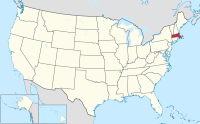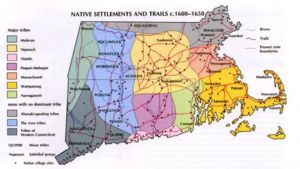More languages
More actions
| Commonwealth of Massachusetts Muhsachuweesut | |
|---|---|
 | |
| Capital and largest city | Boston |
| Leaders | |
• Governor | Maura Healey |
| Area | |
• Total | 27,363 km² |
| Population | |
• 2022 estimate | 6,981,974 |
Massachusetts, officially the Commonwealth of Massachusetts, is a state in the eastern United States of America.
History[edit | edit source]
Early colonization[edit | edit source]

In 1614, the Plymouth Company of England hired John Smith to explore the coast of what is now Massachusetts. He renamed the Wampanoag town of Patuxet to Plymouth. In 1615, Captain Hunt arrived in Patuxet to enslave the Wampanoags and sell them to Europe for 220 shillings each. Between 1615 and 1619, the Wampanoags lost 70% of their population to smallpox, and their northern neighbors, the Massachusett, lost 90%.
When the Pilgrims arrived in 1620, they found well-cleared fields. The average Pilgrim drank at least half a gallon of beer every day, leading Governor William Bradford to condemn them for their "drunkenness and uncleanliness." In the fall of 1621, following a good harvest, they built an 11-foot wall around their settlements to keep the natives out. They held a three-day feast, which Chief Massasoit interrupted. This event has been mythologized as the "first Thanksgiving," which portrays a fictional integrated feast where Pilgrims invited natives to eat with them. Soon after the real feast, Miles Standish beheaded a native man named Wituwamat while pretending to be a trader and displayed his head on a spike for many years.[1]
Metacomet's rebellion[edit | edit source]
In 1675, Metacomet, the son of Massasoit, led a rebellion against the settlers and destroyed 13 settlements. However, the settlers eventually defeated him. They killed or starved around half of the 12,000 natives in the area and enslaved 500 more, sending them from Patuxet to Europe. Like Wituwamat, Metacomet was also beheaded, and his skull was put on a pole for 24 years in Patuxet.[1]
References[edit | edit source]
- ↑ 1.0 1.1 Glen Ford (2023-11-22). "The End of American Thanksgivings: A Cause for Universal Rejoicing" Black Agenda Report. Retrieved 2023-11-23.


